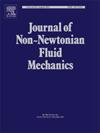粘弹性流动的反常变形张量公式的全耦合实现
IF 2.7
2区 工程技术
Q2 MECHANICS
引用次数: 0
摘要
我们提出了一种全耦合数值方案,用于计算稳定且随时间变化的粘弹性流动。该方案依赖于反变变形张量公式,并使用牛顿-拉斐森迭代来求解非线性方程组。与对数构型等其他重构公式相比,避变重构公式可以相对轻松地计算和实现分析雅各布因子。在稳态剪切流中,协变变形张量会发生旋转,这里的解决方法是将其 "重置 "作为数值方案中的预处理步骤,而不是后处理步骤。我们使用有限元法和标准稳定技术(SUPG 和 DEVSS-G)进行空间离散化。我们在三个粘弹性流动问题中对该数值方案进行了测试,研究了其稳定性和准确性:平面 Couette 流动、环绕圆柱体的二维流动和环绕球体的三维流动。对于所有问题,在牛顿-拉斐森过程中,迭代差和残差都呈二次收敛。此外,我们还观察到残差比迭代差小几个数量级。与显式或半隐式方法相比,本文提出的数值方案的一个显著优势是,它大大放宽了对时间相关问题中时间步长的要求。此外,如果牛顿-拉斐森迭代中的初始猜测足够接近解,则可以高效地计算稳定状态。本文章由计算机程序翻译,如有差异,请以英文原文为准。
A fully-coupled implementation of the contravariant deformation tensor formulation for viscoelastic flows
We present a fully-coupled numerical scheme for computing steady and time-dependent viscoelastic flows. The scheme relies on the contravariant deformation tensor formulation and uses a Newton–Raphson iteration to solve the non-linear system of equations. The contravariant reformulation allows for the computation and implementation of the analytical Jacobian relatively easily, especially compared to other reformulations such as the log-conformation. The contravariant deformation tensor rotates in steady state shearing flows, which is solved here by “resetting” it as a pre-processing step in the numerical scheme, rather than a post-processing step. We use the finite element method with standard stabilization techniques (SUPG and DEVSS-G) for the spatial discretization. The numerical scheme is tested in three viscoelastic flow problems which are studied in terms of stability and accuracy: planar Couette flow, 2D flow around a cylinder and 3D flow around a sphere. For all problems, quadratic convergence is observed in both the difference between iterations and the residuals during the Newton–Raphson procedure. Moreover, we observe that the residuals are several orders smaller than the difference between iterations. A distinct advantage of the numerical scheme presented here, is that it significantly relaxes the requirement on the time-step size in time-dependent problems, as compared to explicit or semi-implicit methods. Moreover, steady states can be efficiently computed if the initial guess in the Newton–Raphson iteration is close enough to the solution.
求助全文
通过发布文献求助,成功后即可免费获取论文全文。
去求助
来源期刊
CiteScore
5.00
自引率
19.40%
发文量
109
审稿时长
61 days
期刊介绍:
The Journal of Non-Newtonian Fluid Mechanics publishes research on flowing soft matter systems. Submissions in all areas of flowing complex fluids are welcomed, including polymer melts and solutions, suspensions, colloids, surfactant solutions, biological fluids, gels, liquid crystals and granular materials. Flow problems relevant to microfluidics, lab-on-a-chip, nanofluidics, biological flows, geophysical flows, industrial processes and other applications are of interest.
Subjects considered suitable for the journal include the following (not necessarily in order of importance):
Theoretical, computational and experimental studies of naturally or technologically relevant flow problems where the non-Newtonian nature of the fluid is important in determining the character of the flow. We seek in particular studies that lend mechanistic insight into flow behavior in complex fluids or highlight flow phenomena unique to complex fluids. Examples include
Instabilities, unsteady and turbulent or chaotic flow characteristics in non-Newtonian fluids,
Multiphase flows involving complex fluids,
Problems involving transport phenomena such as heat and mass transfer and mixing, to the extent that the non-Newtonian flow behavior is central to the transport phenomena,
Novel flow situations that suggest the need for further theoretical study,
Practical situations of flow that are in need of systematic theoretical and experimental research. Such issues and developments commonly arise, for example, in the polymer processing, petroleum, pharmaceutical, biomedical and consumer product industries.

 求助内容:
求助内容: 应助结果提醒方式:
应助结果提醒方式:


